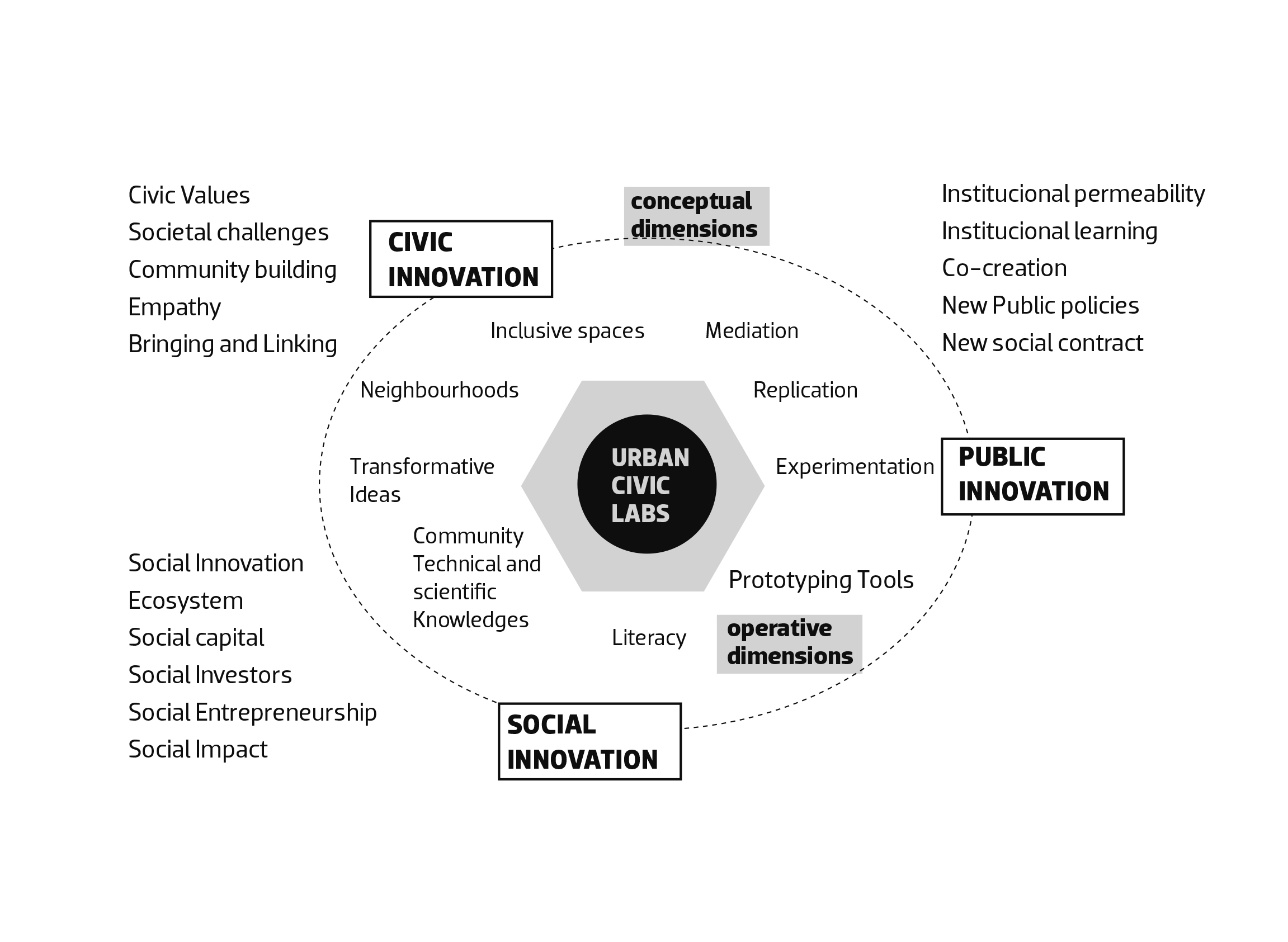
Civic Innovation in Portugal: The potential and limitations of citizen labs to experiment new urban futures
##plugins.themes.immersion.article.figure##

Abstract
Democracy in Portugal is challenged by the lack of awareness regarding decision-making processes, disappointment with quality of life expectations, and a general lack of trust in politics. Citizens' disenchantment with the performance of governors and politicians is reflected in low electoral participation and radicalisation in the public sphere. Despite this, there is a growing inclination towards participatory dynamics and solidarity initiatives. The 50th Portuguese anniversary of democracy in 2024 should draw attention to innovative civic engagement projects that enhance democratic maturity and citizens’ commitment.
The present article aims to conceptualise citizen innovation, and analyse its practices in Portugal, typify models of civic laboratories, and discuss their effectiveness, focusing on results, particularly those that are managed as a bottom-linked model This study carried out a literature review and analysed four recent initiatives in Portugal. Structured in three parts, it discusses civic labs as settings for structural change and analysis of civic innovation in Portugal.
The study emphasises equally the transformative potential of collaborative collective action between citizens and communities, particularly when it is mediated and geographically delimited. Citizen labs are seen as valuable spaces for mapping resources, combining knowledge, and experiencing social transformations with low risk. Regarding civic labs governance models, the bottom-linked approach, although with limitations, tends to reveal a strong potential when compared to top-down institutional or bottom-up community approaches.
Cover page: The conceptual and operative dimensions of the Urban Civic Labs
References
- Estalella, A.; Rocha, J. y Lafuente, A. “Laboratorios de procomún: experimentación, recursividad y activismo”. Revista Teknokultura, Vol. 10 Núm. 1. 2013, pp. 21-48. http://revistas.ucm.es/index.php/TEKN/article/view/48053/44930
- Falanga, R. (2018) Participatory processes for whom? A critical look at Portugal in times of austerityLo Squaderno, 47, pp.37-41Online
- García, M. (2020). Laboratorios ciudadanos y politicas publicas. Cultura, Ciudadania y Pensamiento. https://culturayciudadania.culturaydeporte.gob.es/dam/jcr:f11906d9-4750-4c0a-b309-321218fcc8aa/marcos-garcia.pdf
- Gómez, D., Freire, J. (2023). The emergence of Citizen Labs: A model for the creation of innovation communities. European Public & Social Innovation Review (2023), 8, 2
- Heylighen, F. (1999) The Science of Self-Organization and Adaptivity. In L.D. Kiel (Ed.), Knowledge Management, Organizational Intelligence and Learning, and Complexity. Encyclopedia of Life Support Systems. Oxford, UK: Eolss Publishers Co.
- Irwin A. (1995). Citizen science: a study of people expertise and sustainable development. Routledge.
- Lafuente, A. (2015). Laboratorios Ciudadanos: Conocimiento expandido, ciencia colateral y política experimental. https://www.academia.edu/14149450/Laboratorios_ciudadanos_conocimiento_expandido_ciencia_colateral_y_política_experimental
- Lafuente, A. (2018). Laboratorios Ciudadanos y nueva institucionalidad. Agenda Cultural Alma Máter. https://revistas.udea.edu.co/index.php/almamater/article/view/334573/20790423
- Lafuente A. (2022). Itinerarios comunes laboratorios ciudadanos y cultura experimental. Ned Ediciones. Retrieved January 11 2024 from https://public.ebookcentral.proquest.com/choice/PublicFullRecord.aspx?p=29920105.
- Manzini, E. (2015). Social innovation and design – Enabling, replicating and synergizing. In Stebbing,
- Moro, A. (2023). Design oriented Communities Conference. https://www.dastu.polimi.it/design-oriented-communities/
- Mota, J.C. (2013). "Planeamento do Território: Metodologias, Actores e Participação”. Tese de Doutoramento, Universidade de Aveiro.
- Mota, J.C., Fernandes, A., Moreira, G. (2022 a). Los retos de la innovación ciudadana por parte de las ciudades. El caso del Laboratorio Cívico de Santiago en Aveiro. In : Rubén Camilo Lois González, José Alberto Rio Fernandes e Maria Encarnação Beltrão Sposito (eds.)El Mundo Visto de las Ciudades, pp. 815-824 Tirant lo Blanch
- Mota, J.C., Seixas, J., Ataíde, A., Cardoso, C. (2022b). Evolução das redes locais de solidariedade em Portugal. Análise em tempos de pandemia e perspetivas para o futuro. El apoyo mutuo en tiempos de crisis la solidaridad ciudadana durante la pandemia Covid-19. Editores Oriol Nel·lo; Ismael Blanco; Ricard Gomà. Colección Grupos de Trabajo. ISBN 978-987-813-190- 0 CLACSO. Universitat Autónoma de Barcelona. Instituto de Estudios Regionales y Metropolitanos de Barcelona. Buenos Aires. Mayo de 2022 (https://bibliotecarepositorio.clacso.edu.ar/bitstream/CLACSO/169331/1/El-apoyo-mutuo.pdf)
- Moulaert F, MacCallum D, Mehmood A, et al. (2013) The International Handbook on Social Innovation: Collective Action, Social Learning and Transdisciplinary Research. Cheltenham: Edward Elgar.
- Moulaert, F., MacCallum, D., Van den Broeck, P., & Garcia, M. (2019). Bottom-linked governance and socially innovative political transformation. In Atlas of social innovation. Second volume: A world of new practices (pp. 62–65). Oekoem Verlag; München.
- Mulgan, G. (2006). The process of social innovation. Innovations: technology, governance, globalization, 1(2), 145-162. www.mitpressjournals.org/doi/pdf/10.1162/itgg.2006.1.2.145
- Nel·lo, Oriol; Blanco, Ismael, & Gomà, Ricard (Eds.) (2022). El apoyo mutuo en tiempos de crisis. La solidaridad ciudadana durante la pandemia COVID-19. CLACSO & Universitat Autònoma de Barcelona; 420pp.
- Ostrom T. L. E. (2015). Governing the commons. Cambridge Univ Press.
- Parra, H. Z. M., Fressoli, J. M., & Lafuente, A. (2017). Apresentação: Ciência cidadã e laboratórios cidadãos. https://ri.conicet.gov.ar/bitstream/handle/11336/76755/CONICET_Digital_Nro.881fd847-459e-49af-b296-ea07ca42a7db_A.pdf?sequence=2
- Rey A. A. (2022). El libro de la inteligencia colectiva : ¿qué ocurre cuando hacemos cosas juntos? Almuzara.
- Roche C. (2005). Impact assessment for development agencies : learning to value change (Repr). Oxfam Novib.
- Santos F. & Fundação Calouste Gulbenkian (Lisboa Portugal). (2015). Manual para transformar o mundo (2ª ed. rev. e melhorada). Fundação Calouste Gulbenkian.
- SEGIB/UE/AECID (2022) Soluciones ciudadanas que funcionan El método de los Laboratorios de Innovación Ciudadana
- Sennett, R. (2012) Together: The Rituals, Pleasures and Politics of Cooperation. Yale University Press.
- Watson V. 2014. “Co-Production and Collaboration in Planning — The Difference.” Planning Theory & Practice 15 (1): 62–76. https://doi.org/10.1080/14649357.2013.866266